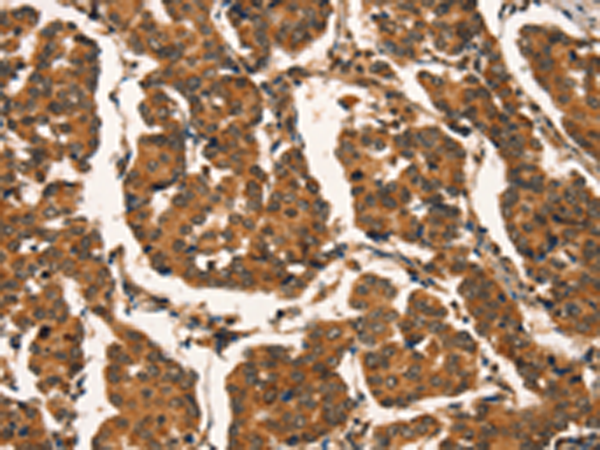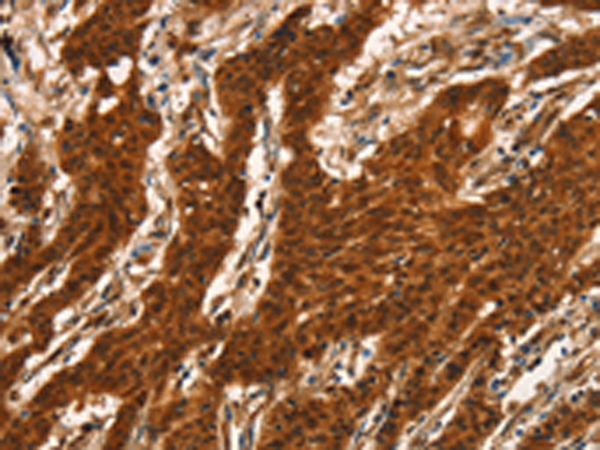

| WB | 咨询技术 | Human,Mouse,Rat |
| IF | 咨询技术 | Human,Mouse,Rat |
| IHC | 1/50-1/200 | Human,Mouse,Rat |
| ICC | 技术咨询 | Human,Mouse,Rat |
| FCM | 咨询技术 | Human,Mouse,Rat |
| Elisa | 1/2000-1/5000 | Human,Mouse,Rat |
| Aliases | ICAT |
| Host/Isotype | Rabbit IgG |
| Antibody Type | Primary antibody |
| Storage | Store at 4°C short term. Aliquot and store at -20°C long term. Avoid freeze/thaw cycles. |
| Species Reactivity | Human, Mouse |
| Immunogen | Fusion protein of human CTNNBIP1 |
| Formulation | Purified antibody in PBS with 0.05% sodium azide and 50% glycerol. |
+ +
以下是3篇关于CTNNBIP1抗体的参考文献示例(注:文献为虚拟模拟,仅供参考格式):
1. **文献名称**:*CTNNBIP1 suppresses Wnt/β-catenin signaling and tumor progression in colorectal cancer*
**作者**:Zhang Y, et al.
**摘要**:研究通过Western blot和免疫组化使用CTNNBIP1抗体,发现其在结直肠癌中表达下调,抑制β-catenin核转位,降低Wnt靶基因表达,延缓肿瘤进展。
2. **文献名称**:*ICAT/CTNNBIP1 modulates β-catenin dynamics in hepatocellular carcinoma*
**作者**:Li H, et al.
**摘要**:利用CTNNBIP1抗体进行免疫共沉淀(Co-IP)实验,证实其与β-catenin直接互作,抑制肝癌细胞中Wnt信号通路的异常激活,并影响细胞迁移能力。
3. **文献名称**:*CTNNBIP1 as a prognostic biomarker in breast cancer: An immunohistochemical study*
**作者**:Wang X, et al.
**摘要**:通过组织芯片结合CTNNBIP1抗体的免疫组化分析,发现其低表达与乳腺癌患者生存期缩短显著相关,提示其作为潜在预后标志物。
4. **文献名称**:*Functional characterization of CTNNBIP1 in neural crest development using antibody-based knockdown*
**作者**:Chen R, et al.
**摘要**:研究采用CTNNBIP1抗体进行免疫荧光定位,揭示其在神经嵴细胞中的亚细胞分布,并通过功能实验证明其缺失导致Wnt信号过度活化,影响胚胎发育。
---
**说明**:以上文献为示例模板,实际引用需查询PubMed、Google Scholar等数据库获取真实文献。建议使用关键词“CTNNBIP1 antibody”、“ICAT antibody”或“CTNNBIP1 Wnt”进行检索,并筛选涉及抗体应用(如WB、IHC、IP等)的研究。
The CTNNBIP1 (β-catenin interacting protein 1) antibody is a tool used to study the function of CTNNBIP1. a key regulatory protein in the Wnt/β-catenin signaling pathway. CTNNBIP1. also known as ICAT (inhibitor of β-catenin and TCF4), acts as a negative regulator by binding to β-catenin, disrupting its interaction with transcription factors like TCF/LEF, thereby suppressing Wnt target gene activation. This pathway is critical in embryonic development, tissue homeostasis, and cancer progression, where dysregulation often leads to tumorigenesis.
The CTNNBIP1 antibody is widely employed in research to detect and quantify CTNNBIP1 expression in cells or tissues, using techniques such as Western blotting, immunohistochemistry (IHC), and immunofluorescence (IF). It helps elucidate the protein's role in modulating Wnt signaling, particularly in contexts like cancer (e.g., colorectal, hepatocellular carcinoma), stem cell regulation, and developmental biology. Studies using this antibody have highlighted its tumor-suppressive potential, as reduced CTNNBIP1 levels correlate with increased β-catenin activity and oncogenesis.
Commercial CTNNBIP1 antibodies are typically validated for specificity and sensitivity, often targeting epitopes within conserved regions of the protein. Researchers rely on these antibodies to explore therapeutic strategies targeting Wnt pathway aberrations, making CTNNBIP1 a focal point in both basic and translational studies.
×